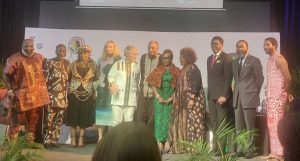An environmental activist, Desmond Majekodunmi, on Monday, October 14, 2024, advised Africans to desist from poaching and indiscriminate felling of trees to protect the climatic eco-system.

Majekodunmi, the founder of Lufasi Nature Park, made the call while speaking during the 2024 edition of “Fela Debates”, with the theme, “The Geopolitics of Africa and Climate Change”, in Lagos.
The programme is part of activities for “Felabration”, an annual music festival in memory and celebration of Afrobeat legend, Fela Anikulapo-Kuti.
The music festival, with the theme, “Look and Laugh”, holds from Oct. 14 to Oct. 20.
Majekodunmi said illegal activities of poaching and felling of trees must be discontinued to protect the environment against manifestation of the effect of climate change.
He advised that, as against these activities, Africans should cultivate the habit of planting more trees and nurture the floral and fauna features the continent was endowed with.
He also advised on improved agricultural activities to mitigate the challenges of food security in the continent.
“As Africans, we should stop ripping off our life support systems.
“Nigeria was known as the highest producer of cassava in the world, Nigeria was the highest exporter of palm kernel in the 1950s, we were also the largest supplier of cocoa, groundnut, cashew and more.
“But we lost it all due to our consideration of profits, Nigeria relented in the production of these crops.
“How is it possible that the most intellectual creature to ever walk on the surface of the earth are destroying their own home,” he said.
Majekodunmi noted that the effects of climate change confronting Africans would not have been experienced if they had yielded to the warnings of late Kofi Annan, Former Secretary General of the United Nations, 20 years ago.
He noted that late Annan said: “The world is reaching a tipping point beyond which climate change may become irreversible.”
He urged the Nigerian government to look into addressing the problem of flooding which constantly caused damage to food crops.
According to him, curbing erosion must also be upscaled as this occurs mostly around the coastlines posing serious threat to the oceans and seas.
Also speaking, Mr Dele Faseemo, Group Head, Energy, Sterling Bank, said the way forward to combat the effect of climate change was for African governments to establish and enforce policies that encourage the adoption of renewable energy.
Faseemo, who was represented by Mr Oluwaseyi Okunuga, sector lead, Renewable Energy, Sterling Bank, noted that African governments must incentivise renewable investments.
He said this could be done by offering subsidies and low interest loans for businesses and households that invest in renewable energy technologies.
“Public-private partnerships can also be leveraged to finance large-scale solar, wind, and other clean energy projects.
“We should also develop and implement national adaptation plans that protect vulnerable communities from climate impact.
“This is by constructing mood defences, improving water management, and enhancing agricultural practices to cope with changing weather patterns.
“We can also adopt green technologies, businesses should integrate renewable energy solutions into their operations, similar to Sterling Bank’s solarisation initiative,” he said.
Mr Wale Tinubu, Group Chief Executive Officer, Oando Plc, reeled out the company’s achievements in trying to mitigate the effect of climate change.
Tinubu, who was represented by Ademola Ogunbanjo, Executive Vice President of Oando Clean Energy Ltd., said that Oando had started electric transportation within Lagos State, in partnership with the Lagos Metropolitan Area Transport Authority (LAMATA).
He said this was to deliberately deal with carbon emissions which in turn pollutes the atmosphere.
He noted that to combat the effect of climate change, Africans must also come up with nature-based solutions, putting into consideration, collaborations.
“The need for energy transition is not government’s need but the people’s need, we all need to take deliberate steps in mitigating the effect of climate change.
“Our plan is to have 2,000 electric cars within Lagos before 2030 and 12,000 in Nigeria before 2030, this is our way of building the next downstream sector for mobility,” he said.
Mrs Titilayo Oshodi, Special Adviser to the Lagos State Governor on Climate Change and the Circular Economy, said the state chose to identify circular economy as the panacea to climate change which many had adopted without knowing.
Oshodi said that the circular economy was a vast one with huge socio-economic opportunities like: textile recycling, electric motorcycling, solar value chain, clean cooking, plastic recycling, plant-based proteins.
She advised Africans to engage in research and see what the nation could achieve exploring each aspect.
By Taiye Olayemi and Dele Eniola
